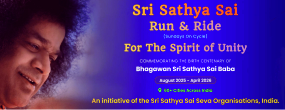The Answers to All Your Questions
Q. What should be the approach of Bal Vikas Gurus?
As teachers of the Bal Vikas classes throughout the country, you do not look forward to monetary or material benefits, and so, you have ample opportunity to make the child’s heart and intellect blossom, through the rays of Love. Let Me tell you that most teachers today have specialised in western types of training, and so they have lost their moorings in our own culture and are unaware of the deeper springs of the spirit. They have been rendered materialistic, worldly and egoistic. They are caught up in the pursuit of sensual pleasure and in the earning of money. They do not know that real education consists in helping the child to manifest the Divinity latent in him. Remember that the children who come to you are all heirs to the richest cultural heritage that the world can give…
I know that great enthusiasm prevails today among both the pupils and teachers of our Bal Vikas classes, for the spiritual ideals cherished in this land since ages. Nevertheless, I must say that there is a great and urgent need for you teachers to receive training in the methods of child education. For example, when teaching the recitation of Bhajans or poems or hymns, you must pay attention to the correct enunciation of each sound, the correct pronunciation of each letter; for, otherwise, the meaning is liable to be warped out of recognition.
- First All India Conference, Madras | April 20-21, 1967
Q. What kind of stories can be narrated to Bal Vikas Students?
One point I must emphasise here is, that you should be careful, while handling some books being published for school use by so called scholars, at the present time. They cast doubts on the truth of great epics like the Ramayana and assert that Dasharatha and Ravana did not exist in authentic history. They characterise them as representatives or symbols of opposing cultures, the Aryan and the non-Aryan, and sow the seeds of factionalism and hatred. By such writings, children begin to doubt the very foundations of goodness, truth and beauty; they are confused while deciding on right conduct, behaviour, ideals and ways of living. You must examine every story or account that you place before the children from the point of view of individual faith and social harmony. Does this lead the child to a better, more harmonious, a more God-oriented life? That is the question you should ask yourself…
The Bal Vikas children whom you are guiding and inspiring, will be the leaders of tomorrow in this land. The virtues you implant in them, the counsel you are providing them and the examples you place before them will remain carved in their memories and transform their outlook and behaviour in the days to come.
- First All India Conference, Madras | April 20-21, 1967
Q. What is the role of parents in Bal Vikas?
Teachers are the sculptors who shape the rocks into things of beauty and significance, of utility and inspiration. They study the pupils, their nature and equipment, and decide on their roles in society, their paths and the stages in their progress. But it must be pointed out that the sculptor or teacher is not the only factor, to be reckoned with in the process of education. The mother and father of the child too have important roles in the process… The teacher and the pupil have to be brought to each other and encouraged to learn and teach, to share lovingly their knowledge and experience, by the parents, so that education might proceed, and the child inherit the heritage left by its forefathers… The teacher must win the reverence of the pupil by showering on him his Love; the pupil must win the Love of the teacher by showering on him reverence and affection. It is a mutual transaction, a sharing of the emotions of the heart.
- First All India Conference, Madras | April 20-21, 1967
Q. Why should Bal Vikas Teachers be referred to as Bal Vikas Gurus?
We have heard the Guru being praised as equal to God Himself in the Shloka where the Guru is referred to reverentially as Brahma, the first of the Trinity entrusted with Creation; as Vishnu, the second of the Trinity entrusted with the preservation and protection of Creation; and as Maheshwara, the last of the Trinity, charged with destruction and dissolution. This description is symbolically correct, as we can see when we analyse the work which the Teacher or Guru is expected to carry out.
The Guru sows the seeds of virtue, of wisdom, and of faith in the heart of the pupil. He is, therefore, Brahma, of the nature of the Creator. He is like the farmer who plants saplings in the well-prepared soil of his field. But the farmer does not sit with folded hands thereafter. He takes incessant care to see that the saplings grow vigorously and well, and he is vigilant to water the growing crops and feed them with fertilisers at the appropriate stages of growth. This is the role of Vishnu so far as education and the educator are concerned. The Guru cannot sit back and silently watch the fate of the pupil, after the first few lessons. He must guide the pupil at every step, foster and encourage good habits, sound reasoning and valid emotions, and act as Vishnu, the second of the Trinity. The Guru has also the duty cast on him, to watch every step of the pupil, and warn him off, when he takes false step, develops a bad habit, or entertains a deleterious doubt. Like the farmer who has to be vigilant against the growth of weeds or the upsurge of pests, the Guru too must be ever alert to destroy the pests of vice and the weeds of sloth and unsteadiness.
The word ‘teacher’ cannot denote these high roles; it can mean only those, who transmit information, and train in skills. I direct that Bal Vikas teachers should hereafter be known by the vastly more appropriate name of Guru, so that you may be conscious always of the spiritual role which you have taken on, and its responsibilities and value. You are the lamps from which their tender hearts must receive light and love. By your adherence to truth, righteousness, peace and love, you have to inspire these qualities in the children that come to you and the homes from where they come.
- First All India Conference, Madras | April 20-21, 1967
Q. What should Bal Vikas Students be encouraged to do in return for the service received from the Gurus?
Instruct the children of the Bal Vikas to revere their parents. This is the first thing to do. It is a simple act of gratitude, for those who endowed them with the material instrument for life. But, mere possession of the human body, however wonderful it may be, is not enough, for one’s peace and joy. One must know how to unravel its mysteries and how to regulate one’s own impulses and hungers. This process is accomplished by the Guru, and so the pupils must be instructed and encouraged to revere the Guru, in gratitude for the service he renders. Education must aim at providing the child, not livelihood, but, a life worth living.
- First All India Conference, Madras | April 20-21, 1967
Q. Can Bal Vikas classes be attended by children of all faiths?
Some teachers ask Me whether Bal Vikas classes can serve children of all faiths or whether they can admit only children of the Hindu faith. The question has arisen because the questioners do not know the very fundamentals of the Hindu Faith. There is only one religion, remember, and that is the Religion of Love; there is only one caste, and that is the Caste of Humanity. You must be careful not to encourage or entertain the slightest trace of ‘difference’ on the basis of religion, caste, creed or colour, in the Bal Vikas classes. Do not tarnish the spotlessly clean minds of the children by infecting them with a sense of distinction between one child and another. Impart instructions and inspiration equally to all. Select stories from the scriptures of all faiths to interest the children in the values of good life. Speak to them of the moral heroes of all lands, the saints of all faiths. For, they are all of the same stamp. No scripture enjoins violence or lays down untruth as a way of life. All religions extol Truth, Righteousness, Peace, Brotherhood and Love. All saints are embodiments of service, compassion and renunciation.
- First All India Conference, Madras | April 20-21, 1967











































